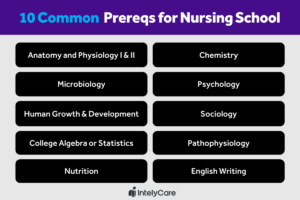A Guide to Prereqs for Nursing School

Prereqs for nursing school — short for prerequisites for nursing school — are specific classes that are required to be completed before applying to a nursing program. These courses aren’t random; they are carefully selected to provide a solid academic base, preparing you for what lies ahead. The goal is to ensure that you have all the fundamental knowledge and skills needed to succeed as a nursing student.
This guide is your go-to resource for nursing school prerequisites. We’ll discuss what they are, which courses nursing schools require, and delve into other admission requirements to equip you with everything you need to apply to your chosen academic program.
What Are Prerequisites for Nursing School?
You can think about prerequisites as the crucial foundation for your journey into nursing school. The specific list and the exact number of prerequisites will vary depending on your educational background and your chosen program — nursing school requirements vary from institution to institution.
If you have a previous degree in a non-nursing field, some classes might be waived. Here are common prereqs for nursing school courses that future nurses are often required to take.

Overview of Prereqs for Nursing
1. Anatomy and Physiology I and II
What’s it about?
This class focuses on the structure (anatomy) and function (physiology) of the human body. It explores how different systems work together to maintain life and often includes laboratory components where you’ll gain hands-on experience, such as anatomical dissections, physiological experiments, and the use of medical instruments.
How many credits?
The credits may differ between schools, but usually, both classes with their labs sum up to around 8 credits.
How long will it take to complete?
It could take two semesters to complete both classes with labs.
2. Microbiology
What’s it about?
Microbiology explores the world of microorganisms, including bacteria, viruses, fungi, and protozoa. The course covers topics such as microbial morphology, physiology, genetics, and ecology. The laboratory component allows you to cultivate, observe, and analyze microorganisms.
How many credits?
Typically, this course is worth 4 credits with a lab.
How long will it take to complete?
One semester.
3. Human Growth and Development
What’s it about?
This course reviews stages of human development from infancy to old age. You’ll learn the factors influencing growth, including genetics, environment, and cultural context. Topics may include prenatal development, childhood milestones, adolescence, adulthood, and aging.
How many credits?
Typically, this course is worth 3 credits.
How long will it take to complete?
One semester.
4. College Algebra or Statistics
What’s it about?
In college algebra, you’ll explore fundamental algebraic concepts, including equations, inequalities, functions, and polynomial expressions. Statistics introduces you to the principles of collecting, analyzing, and interpreting data. Both courses play a crucial role in developing quantitative reasoning skills and strengthening problem-solving abilities.
How many credits?
Typically, each course is worth 3 credits.
How long will it take to complete?
One semester.
5. Nutrition
What’s it about?
In this course, you’ll examine the roles of macronutrients (carbohydrates, proteins, and fats) and micronutrients (vitamins and minerals) in maintaining health. Topics include digestion, absorption, metabolism, and the physiological effects of different nutrients. You’ll also study the relationship between nutrition and various health conditions, highlighting the importance of a balanced diet for disease prevention.
How many credits?
Typically, this course is worth 3 credits.
How long will it take to complete?
One semester.
6. Chemistry
What’s it about?
This course provides a foundation for understanding the world at the molecular level. Topics covered include atomic structure, chemical bonding, and reactions. Through laboratory work, you’ll gain hands-on experience in conducting experiments, making observations, and analyzing results.
How many credits?
Typically, this course is worth 4 credits with a lab.
How long will it take to complete?
One semester.
7. Psychology
What’s it about?
This course delves into the fundamental principles and theories that shape our understanding of mental processes, emotions, and actions. You’ll explore topics such as cognitive processes, personality development, and psychological disorders, and gain insight into the factors influencing human behavior.
How many credits?
Typically, this course is worth 3 credits.
How long will it take to complete?
One semester.
8. Sociology
What’s it about?
Sociology explores how society shapes individuals and how individuals shape society. You’ll examine social institutions, relationships, cultures, and the forces that influence human behavior within a collective context.
How many credits?
Typically, this course is worth 3 credits.
How long will it take to complete?
One semester.
9. Pathophysiology
What’s it about?
Pathophysiology class delves into the study of how diseases or disorders affect the normal functioning of the body. In this course, you’ll learn to understand the root causes of health issues and gain insights into the connections between cellular changes and the manifestation of diseases.
How many credits?
Typically, this course is worth 3 credits.
How long will it take to complete?
One semester.
10. English Writing
What is it about?
This course is all about exploring the art of clear and impactful writing. It covers essay organization, grammar, and style, to help you convey your ideas effectively.
How many credits?
Typically, this course is worth 3 credits.
How long will it take to complete?
One semester.
Other Nursing School Necessities
In addition to completing prereqs for nursing, applying and getting accepted to a program often involves meeting several other requirements, such as:
- Admission exam
- Letters of recommendation
- Clinical experience
- CPR certification
- Background check and drug screening
- Health and immunization records
- Interview
- Writing sample, motivational letter, or personal statement
It’s important to thoroughly review the admission packet of the specific nursing programs you are interested in, as application instructions can vary.
Prereqs for Nursing: FAQ
How long does it take to complete prerequisite courses?
On average, completing all nursing school prerequisites may take approximately one to two years, depending on the specific requirements and scheduling.
Where can I take prerequisite courses for nursing?
You can take nursing prereqs at community college, university, or in online settings for flexibility. Check in with your admission counselor to make sure the courses you’ve selected align with the requirements of your chosen nursing program.
How many prerequisites are needed for nursing?
The number of prerequisites needed for nursing typically falls within the range of 5 to 15 courses, but this can vary based on the specific requirements of the nursing program you choose.
Can I transfer prerequisite credits from another institution?
Yes, it is often possible to transfer credits. However, every institution has its own transfer credit policies. Check with the specific school for details. And if you’re already in nursing school and looking to make a switch, learn more in our guide to transferring nursing schools.
Are there online schools for nursing prerequisites?
Yes, many nursing schools accept online courses for prerequisite requirements. However, courses with lab components might not be available in an online format. Confirm with your nursing program to ensure your selected online courses meet their criteria.
What GPA is typically required for prerequisite courses?
The GPA required for prerequisite courses can vary, but many nursing programs typically look for a competitive GPA of 3.0 or higher. However, a higher GPA can enhance your application.
Can I retake prereqs for nursing school to improve my grades?
Many nursing programs allow students to retake prerequisite courses to improve grades. However, policies can differ, and some schools may have restrictions on the number of retakes or how they factor into the overall application.
Ready to Step Into the Nursing Field?
You’ve learned all the details about prereqs for nursing school. Now, let’s find you a great-fitting job. Sign up with IntelyCare today for a personalized job search experience.
